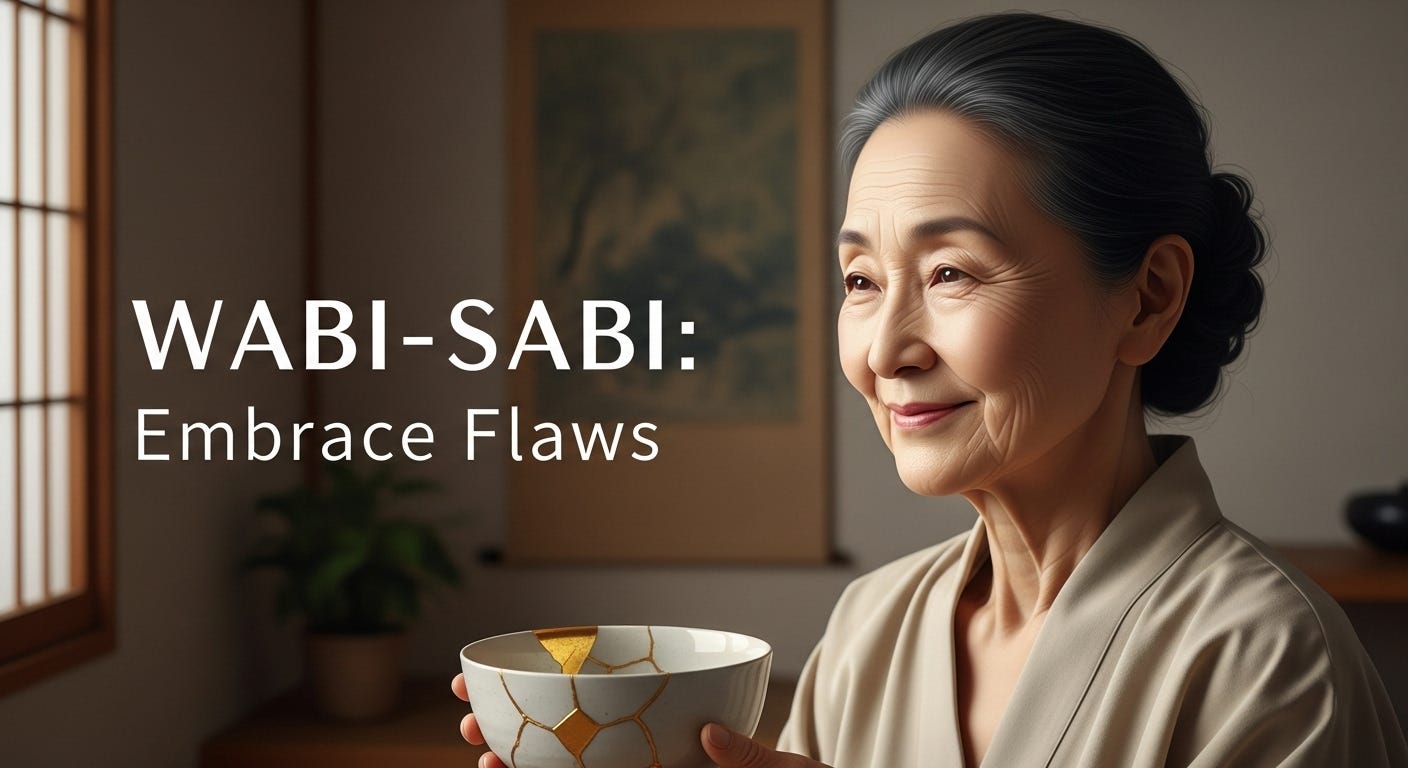Wabi-Sabi: The Japanese Philosophy That Cures Perfectionism and Anxiety
Have you ever felt trapped, suffocated by the unrelenting pressure to be perfect? Like you're constantly chasing an ideal, a flawless version of yourself that always seems just out of reach? In a world meticulously curated by filtered photos and the relentless demands of the "hustle" culture, this pursuit of flawlessness is, ironically, making us anxious, burnt out, and deeply unhappy. But what if there was another way? A path that embraced the very imperfections we try so hard to hide? A philosophy that finds beauty not in perfection, but in the gentle embrace of reality? Let's dive in.
The Unseen Chains of Perfection
Think about it. Our lives are increasingly obsessed with the polished, the pristine, the perpetually new. Social media, our constant companion, bombards us with images of seemingly perfect bodies, relationships, and achievements. This constant barrage creates an illusion, a mirage of flawless lives that fuels our own insecurities and anxieties. Are we enough? Are we doing enough? The internal monologue, often critical and relentless, never seems to let up.
This relentless pursuit of perfection is a heavy burden. It crushes our creativity, stifles our authenticity, and leaves us feeling perpetually inadequate. But what if we could break free from these invisible chains?
Introducing Wabi-Sabi: A Different Way of Seeing
Enter Wabi-Sabi, a profound Japanese philosophy that offers a radical alternative to the Western obsession with perfection. It’s not just an aesthetic; it's a way of seeing the world that finds beauty and peace in imperfection, transience, and simplicity. It's about embracing the cracks, the flaws, the things that make us uniquely, beautifully human.
Think of a perfectly polished stone versus a weathered one, smoothed by years of wind and water. Which one tells a more compelling story? Wabi-Sabi would argue it’s the weathered stone, the one that has experienced life, that holds the true beauty.
To truly understand Wabi-Sabi, you have to watch this video:
It offers a clear and engaging explanation of the core concepts.
The Core Principles of Wabi-Sabi
Wabi-Sabi is built on two fundamental pillars:
Wabi: This refers to rustic simplicity, quiet taste, and a deep appreciation for the unassuming. It's about finding beauty in the natural, unadorned state of things.
Sabi: This speaks to the beauty of age and wear. It's the patina on an antique, the gentle weathering of a wooden bench, the wisdom etched on a face. It's the beauty that comes from the passage of time and the acceptance of change.
These two concepts, working in concert, provide a framework for embracing the imperfections inherent in life and finding beauty in the transient nature of existence.
Kintsugi: A Metaphor for Life
Perhaps the most powerful metaphor for Wabi-Sabi is the ancient Japanese art of Kintsugi, the practice of repairing broken pottery with gold. Instead of discarding the broken pieces, they are carefully mended, the cracks highlighted with gold. The result is not a "perfect" piece of pottery, but one that is even more beautiful, more valuable, because of its imperfections.
“Kintsugi is a beautiful metaphor for resilience. It teaches us that the things that break us can also make us stronger and more beautiful.”
Think about this for a moment. Our "breaks" – our failures, our mistakes, our vulnerabilities – they don't diminish us. They are, in fact, an essential part of our story, adding depth and richness to our lives. They are the gold that fills the cracks, making us more resilient, more authentic, and more beautiful.
Practical Applications of Wabi-Sabi
So, how can you apply this profound philosophy to your own life?
Embrace Imperfection: Let go of the need to be perfect. Allow yourself to make mistakes, to be vulnerable. Remember that it's through our imperfections that we learn and grow.
Appreciate the Transient: Recognize that everything is temporary. This understanding can bring a sense of peace and gratitude for the present moment.
Find Beauty in Simplicity: Declutter your life, both physically and mentally. Focus on what truly matters and let go of the unnecessary.
Cultivate Gratitude: Appreciate the beauty in the everyday – the sunrise, a warm cup of tea, a shared laugh with a loved one.
Practice Self-Compassion: Treat yourself with the same kindness and understanding that you would offer a friend.
The Freedom of Imperfection
Embracing Wabi-Sabi is liberating. It frees you from the crippling fear of failure and the endless pursuit of an unattainable ideal. It allows you to be present, to appreciate the beauty in the ordinary, and to find peace in the face of change.
Consider your creative pursuits. How many ideas have you abandoned because they weren't "perfect" enough? Wabi-Sabi encourages you to simply start. To embrace the imperfections of your first drafts, to learn from your mistakes, and to enjoy the process of creation, not just the outcome. In your home, it can also transform your perspective. Instead of striving for a magazine-perfect space, it encourages you to find beauty in the lived-in quality, the well-worn objects that tell the story of your life.
Unlock deeper insights with a 10% discount on the annual plan.
Support thoughtful analysis and join a growing community of readers committed to understanding the world through philosophy and reason.
A Path to Peace and Authenticity
Wabi-Sabi is not just a trend; it's a profound philosophy that offers a path to a more authentic, peaceful, and beautiful way of living. It's about finding beauty in the broken, embracing the transient, and celebrating the imperfections that make us human.
The next time you find yourself striving for perfection, take a deep breath. Remember the weathered stone, the golden cracks of Kintsugi. Remember the beauty of being, not just becoming. Let Wabi-Sabi guide you towards a life lived fully, authentically, and with a deep appreciation for the beauty that exists, right here, right now.



